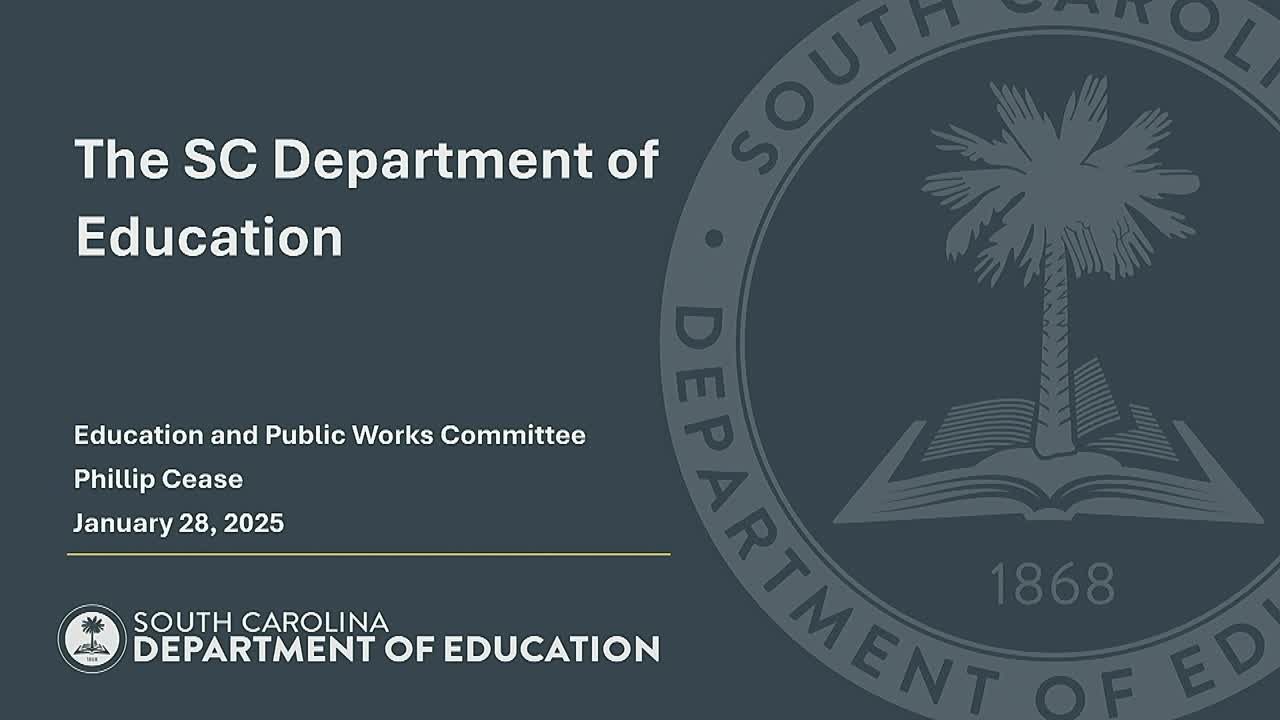State Department of Education outlines literacy, math and school-safety priorities and budget requests
Get AI-powered insights, summaries, and transcripts
Subscribe
Summary
Philip Cease, director of governmental affairs for the South Carolina Department of Education, briefed the House Education and Public Works Committee on the department’s strategic plan and priorities—literacy training, a Palmetto Math Project pilot, a statewide cell-phone model policy and a multi-item budget request that includes pay and instructional-materials funding.
Philip Cease, director of governmental affairs for the South Carolina Department of Education, told the House Education and Public Works Committee that the department’s strategic plan ("1-4-1-4") centers on accelerating evidence-based instruction, expanding career pathways, supporting school culture and launching statewide community engagement.
Cease described the department’s literacy and math priorities: the statewide Science of Reading professional learning (LETRS) for K–3 teachers, funded by nearly $40 million and delivered through stipends and training; and an early rollout of the Palmetto Math Project modeled on the Palmetto Literacy Project to target underperforming schools with additional resources. He said the department expects all K–3 teachers to have LETRS training by the 2025–26 school year and that roughly 20,000 teachers are in the pipeline or have completed the training.
On accountability and student outcomes, Cease said Read to Succeed 2 increases the retention threshold and that under current policy 16,238 third graders would have been eligible for retention based on this year’s metrics; summer reading camps and other interventions are included in the department’s budget proposals to address that group. The department also produces public materials and videos at ed.sc.gov/literacy, Cease said.
Cease summarized the State Board–required cell-phone model policy passed in the current appropriations proviso and the State Department’s "Free to Focus" framework. The proviso requires districts to adopt a model policy (or risk losing state classroom aid) and defines access as viewing, holding or otherwise using an electronic device during the school day (expanded from an earlier draft that covered only instructional time). Districts may implement a range of options—carrying phones in backpacks, using phone pouches or placing phones in lockers—and local boards determine consequences and permitted exceptions, Cease said.
The department’s budget requests described to the committee include: a $200 million recurring proposal to raise starting teacher pay to $50,000 (the department said that would add roughly $3,000 for each pay step on the scale); $20 million recurring and $95 million nonrecurring for high-quality instructional materials (math and ELA); targeted funding for summer reading camps tied to retention; $13 million for a CTE Rural Renaissance; and requests for a rural facilities/infrastructure bank and a recurring $100 million ask for safe schools and facility upgrades (including a rural infrastructure bank, school facilities upgrades and bus fleet replacement).
Cease also described a statewide volunteer program that allows State Department employees to spend paid time volunteering in local schools and said the department wants to expand the approach with other agencies and businesses.
Committee members asked about AI use for individual tutoring, implementation details for LETRS and Palmetto Math, cell-phone implementation complaints and planning for the anticipated retention cohort. Cease said the department will provide details and that many questions are district-level implementation decisions. "There is a law … about character education," he said when describing behavior and school culture resources; "we are working on getting high-quality resources pushed down to schools."
Cease closed by urging lawmakers to review the department’s strategic materials and attend budget hearings for more detailed discussions of the funding requests.
